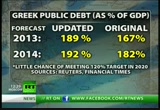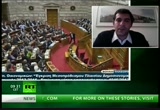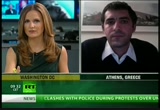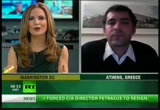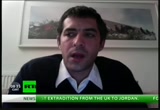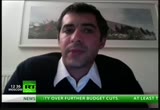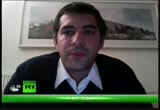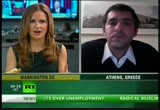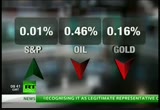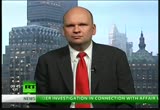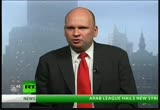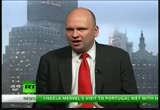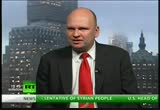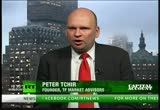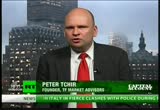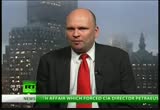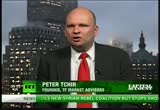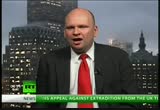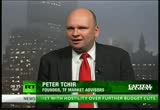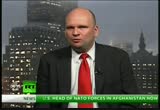tv [untitled] November 13, 2012 3:30am-4:00am EST
3:30 am
it then in two thousand and twenty set by lenders last march now projections have been revised upward as the f.t. points out partly because the troika bailouts have added to the debt of the country that already counted among its top problems that it couldn't pay its debt now from the inside of greek parliament these votes on austerity have meant the governing center coalition is losing members and we may be on the verge of new elections all over again before too long and from the ground in athens greek journalist younis paleologue can give us a perspective because he's been covering this so first thank you so much for being on the show and you now from a perspective sitting here in washington or in the u.s. you know we hear about crucial votes we see protests we know about strikes it kind of feels like another day in the life of greeks that we've come to expect over the past year is sadly for those of us who are in greek all of these measures and votes tend to really blend together so what was in the bill passed last wednesday in the greek parliament and in the budget passed last night in short. well.
3:31 am
there are two types of measures in the buildings. but one type is one that the prime minister himself has referred to as unfair and such as he would like to change them in the future so these include new pension cuts including for people who didn't get paid high pensions to begin with your wage cuts. for large numbers of people in the public sector and. new restrictions on wage growth in the private sector and measures to make it easier for employers to fire people in the private sector and of course unemployment is already at twenty five percent so you can see that this is not exactly meeting people they hope for the future right the good side that the other side of measures are structural reforms that governments of late for a very long time some of which. could in
3:32 am
a better climate be to the beginnings of an economic recovery and do important things like a much better revenue collection from the government but of course all of these positive measures are overshadowed by the continuing austerity ok and in terms of the austerity and both the positive developments how would you compare these to previous measures is that just kind of more of the same but take it one step further next with some of these structural reforms that have been anticipated for a while that haven't yet been voted on its own now. well the some of the hysteria the measures are extremely harsh and they continue the same pattern but of course it's a lot harsher when you've been as you mentioned already through five years of recession and you are on your way to six. and the other problem of course is the structural reforms if they have come at a time when the economy wasn't in such a state of freefall the have a much better chance of working and kick starting some kind of recovery now in
3:33 am
a condition of total depression it's impossible for them to. kick start anything that's a really interesting point and i know too just from the political side there was some drama surrounding the actual voting for these two bills in parliament there were members of both in and out of the governing coalition that broke ranks with their party with their votes and this place plus soccer new democracy traditionally the two largest political parties in greece that have jostling for power over the past thirty years they're just one seat shy of losing a majority and they're part of a weak coalition that includes just a small center left party so do you think the current government governing coalition can hold. well it's so very tenuous i mean new democracy they are by far the largest part. they're down to one hundred twenty five m.p.'s out of a dozen three hundred. which used to being. the last man was the
3:34 am
largest by the president with a slim majority in parliament is basically falling apart as a plus the there are many about whether we continue to exist. you know twenty months from now. and the democratic left the small center left party has voted for the budget but it voted against the. you know the the the measures last wednesday so you know it's sort of both in and out of the governing coalition and no one knows when they come to vote on the laws that we implement what they voted on last wednesday whether they will remain and so you know it's anyone's guess but it's a likely scenario that in the next few months we will have. the government following up on wow and that's of course a whole other factor that piles on to to the struggles now let's talk about some of the measures that have been toppled talk about privatization i know there were some privatization measures passed as part of a recent vote at the end of october and i should mention too that the two thousand
3:35 am
and thirteen budget targets are reportedly tied to privatization proceeds now there are many who would argue that privatisation of the greek economy is perhaps a long overdue we desperately needed but what i think and interesting is how it's being done essentially the point of a gun and if the greek people can possibly get a fair deal for public wealth during a time like this where they're in a depression a fire sale. well it's a complicated issue i mean one interesting thing to look at when they first presented the provider privatization program in february twenty eighth eleven the target was to get fifty billion euros by ten to fifteen. you know this was ludicrous and they quickly revised downwards but as recently as last september the head of the privatization agency talked about nineteen billion in proceeds by twenty fifteen and of course with the new budget it's down to i think something like seven billion by twenty fifty nine and a half twenty sixteen so. it's it's not happening it's not going well and the
3:36 am
reasons i mean one reason is that the political parties don't want to lose control of these companies because their cash cows they used to be cash cows and they were also a means through which they could get political clients appointed to jobs for life and so on and so forth but also. since last year since the conversation began about greece leaving the eurozone it became virtually impossible to attract any interest in. privatization in greece because no one wants to invest in your o's and get. revenues in drachma. beyond that though and the question you raise about the prices you know greece is in a state of emergency. obviously would be better to have some of these companies when they were doing much better but if they can get good deals not in terms of the you know the actual say but in terms of the commitments to investment and job
3:37 am
creation that we help. begin the economic recovery then you know. there's not much of a choice. right and there's the flip side you mention of at least a kind of start to a road at this kind of kleptocratic system which i want to talk more about let's talk about the privilege let's talk about the connected and if they're i'm willing to carry their weight still because there was a really interesting story surrounding the wednesday vote there was an attempt by the government to integrate parliamentary employees with the rest of public sector employees in terms of reforms to pensions and benefits things like that and these employees when they heard about the plan change were screaming down the hallways reportedly and got lawmakers to stop the vote and i guess there was some kind of promise to reintroduce these measures later this find fascinating what can you tell us about this and what it reflects. well i was actually there in the parliament building when it happened and i was sitting inside the hall and listening to the bait and i heard this or you know hollering and my first thought was that you know
3:38 am
the protesters from outside actually broken into the building as they have attempted to do a few times before and when i went downstairs i saw that it was actually you know the the employees of the parliament who had streamed down from their offices they had heard about this proposed amendment which would integrated them as you said into the but common status for all public sector workers. these people you know some of them work long hours and do a very good job but the vast majority of them are people who have been appointed by the members of parliament by ministers their friends relatives you know compatriots . some of them you know never appear at their jobs. before the beginning of the crisis they got sixteen salaries instead of twelve so you know and the fact that they basically had the parliament hostage during such
3:39 am
a critical debate for the future of the country is i think you know astounding very shocking and should have been treated with greater. by the government it was a you know it was shameful that they backed down but hopefully they will bring the men back soon so it's a bigger picture does that show that even during these crucial critical times there are privileged sectors there are above the cut above the austerity and there is i guess i'm also i tear public sector if you will. well there is i mean there's privileged groups both in the public sector and among the professional classes which you know have always had. a privileged connection with the political parties and the government and of course the you know the true story of greece's holding of them to change in the last couple of years has been that these groups have been unwilling to and have been the fuchsias. among the fiercest of those who resist the
3:40 am
changes and you know a view that says that. you know it's the government trying to impose austerity on wage earners in order to you know save itself and save international bankers gets the picture very wrong in fact you know the biggest picture is of the old political system and its clients trying to impose as much of the cost of adjustment on the outside there is in order to retain as many of the privileges of the privileges that they have. but yeah i mean i think it's a really interesting note to end on i think from a broader perspective it's important to note all of these new wants and the role of a government itself when it's dealing with these crises and where that burden is felt especially as people look to solutions to debt crises and economic problems all over the world so thank you so much john especially a lot of us for that view from athens for covering this. and still ahead move over
3:41 am
3:42 am
3:43 am
was the plan that was responsible for causing the world's worst industrial disaster and now it had been abandoned in a condition where it had become a source of pollution of the most recent study that was done shows that this water pollution and spreading. more than hundred thousand people in. groups welcome and. more likely to be born with birth defects and children. in the sea as little as five hundred dollars. unpunished. politics culture.
3:45 am
and from greece to spain and italy and the rest of the eurozone and us to here in the west because the eurozone is so impactful has the crisis been contained or is contagion still a concern for the periphery in europe and looking to the u.s. with concern over the fiscal cliff dominating headlines does a forecast about the u.s. as energy outlook represent tailwind well joining us from our new york studio is peter chere founder of t.f. market advisors so thank you so much were it's so nice to get a broad multitude of perspectives on the show today thanks for being here peter thanks yeah so we just heard kind of an on the ground perspective insider's perspective as to what's been going on in greece recently with the votes with the economy with just kind of the political and economic picture but from your perspective from an investment perspective what do you think is going on with greece in terms of its outlook as i know that you think that the troika might actually be closer to considering a default and then some would think and what does this mean for other countries
3:46 am
larger countries like italy and spain right i think they really have to get their act together and i think just like the previous guest was talking about there's still too much denial there's the troika seem somehow to think that greece should pay the but not pay other people and it's very confusing i think one of the first big problems we saw back in greece when they were willing to change their laws so they could default on the private sector bondholders that's one reason they can't do privatizations a country that's going to change their laws retroactively you're not going to go in there and do business and i keep thinking that the only way europe is going to survive right now is if the official sector so the e.c.b. the you the i.m.f. actually forgive some of their debt to greece if they force greece out if this gets contentious and greece decides not to pay them i think we will see if we you know capital flee out of spain and italy if greece can go if greece can exit and it's disorderly i think immediately people take a look at their businesses in spain their deposits in spain and he plans to do business in spain or italy and say you know what let's hold on. yeah you know it's
3:47 am
interesting i did see one one fact from sam b.c. actually that over seventy percent of greece's debts are now owed to official lenders such as the e.c.b. and the i.m.f. so that's a significant chunk that you're saying they need to forgive some of that now as far as italy and spain you had an interesting point you're writing about corporations having revolving credit lines and how it's a bad sign from a credit perspective when they draw down on it but they have them for safety in case they can't get cash so what's the importance of revolving credit in europe and are those policies in place you know there are and i think that's one thing right now if we look at say oh and here these outright monetary transactions the e.c.b. wants the i.m.f. to help negotiate a plan to put it into action in spain and spain says they don't want to put in until they need it but they should be doing right now is negotiating here's what the deal will look like here's where we're backstop is and that will give comfort so if the markets get worse if the g.d.p. gets worse in spain if we see you know unemployment rates continue to deteriorate everyone will know in their back pocket they have this outlet for their bonds they
3:48 am
have this program in place so i think they should behave very similar to a corporation put these revolving credit lines in place it's not great if they draw down on them but at least it's out there it will take some of this uncertainty and for once and for all it would stop this problem that we have that the only time you're opposed together or does anything in the times of crisis we all know that if they're in crisis negotiations where they feel they have to wake up at four in the morning in brussels to get some press release out you're not getting a good solution so i think they should put this backstop in negotiated now and then go forward on better long term solution and this is to avoid a lehman type moment lehman type scary moment which you know to put in perspective lehman's collapse wasn't about one firm going going under it was about the chain of panicky events that followed it and created this whole crisis so what would a lehman event coming out of europe look like at this point in terms of the consequences and the fallout you know i think we would see a. immediate shutdown of global trade no one's going to want to do business with
3:49 am
spain or italy at that point they're going to be concerned about in fact every businessman is going to call and find out what are they owed from those countries what deliveries do they have to them what assets they have on the ground there and try and figure something out about that and then quickly people are going to look spain and italy are like this maybe france is in trouble maybe someone else is in trouble so i think you will see this contagion go very very quickly and just like in lehman these things tend to happen very quickly it's a bit sketchy it's a bit sketchy and then it's wow and so i think that's why they need these things in place they need to show a willingness to backstop each other and that will take some pressure off the market and if pressure occurs we will get reaction you know the worst thing that could happen is all of a sudden the markets decide to sell off right around the holidays and can't be reached or people are on around or someone decides they you know are just against it and want to delay a vote and they don't react in time and i think once the psychology hits that point where they decide europe might not react in time it will be too late and short you
3:50 am
don't think that europe is out of the clear by any means it sounds like and you think a lehman moment could still come out of the continent i do and i think you know the markets become a bit complacent about it again you know myself i do think they're going to do something and the reason we optimistic but you know one of the things today you know one of our clients was looking at google search fiscal cliff everyone searching for that known as looking for euro crisis anymore it's dropped off the charts in terms of popularity and what we've seen in the markets over and over for the past couple years so whenever something you know is in everyone's mind it turns out to be priced in the issues that aren't being looked at that catch us by surprise then known and unknown surprised and people know that they're no no no it's not a black swan so then let's let's bring the two to another one of these factors that's kind of not getting as much play as say the fiscal cliff is which is a no known the i e a so this is the west energy agency is how it's described its international energy agency it actually says it sees the you. u.s.
3:51 am
becoming the world's biggest oil producer by two thousand and seventeen and the biggest gas producer by two thousand and fifteen becoming almost entirely energy self-sufficient by twenty thirty five which is around the corner but it's you know somewhere out there do you buy this and bigger picture what could this mean for the u.s. economy. you know i've been following natural gas and i think natural gas has been one of those stories that's been lost during this whole crisis where i think it's incredibly helpful to the u.s. we've got cheap natural gas you know the u.s. did not worry so much about being a producing nation or a manufacturing nation and through two thousand and four two thousand and seven we were about housing finance and now we want to be producers we want to manufacture things again and this cheap natural gas has been you know a huge boon to that it is helping get some business back onshore and i think if this report is correct on oil that's further help and i think at the same time you know the politicians have to address and help the country move forward on these resources there is way too much time spent silly or poorly thought out you know green energy products projects you know so linder was
3:52 am
a disaster it wasn't the only one and it's time let's harness the resources that we have that we know how to use and use that to help get the economy going and the nice part of the energy industry on top of being a cheap source of raw materials they provide great jobs high paying jobs in sort of jobs we want to create in this country so i think this is really encouraging it doesn't get enough focus there's a little bit too much i think obviously they've got to balance the environmental concerns but i think this is the one told story that might actually come into play and might really help the u.s. turn around well and in that situation looking today at the news today there are reports that japan is headed towards its fifth recession and fifteen years and you can is often compared to when people look at the u.s. and the u.s. says oh the u.s. is on the path of japan they either say that because they want to say how bad the u.s. is doing and how long this is going to be or they say hey look you know you can keep sputtering along for a really long time without just like falling off the map and being priced out of
3:53 am
the bond market but regardless what does this kind of energy outlook mean that the u.s. if you're comparing it to japan could age a little better does it change like this i think it could it's funny it's you know four years ago when this whole process of q.e. started in a recession it. he said that look like japan you'd be laughed out of the room everyone would just say oh we're not japan we're not japan and you could mention any one of our markets not like japan four years into it more and more people are saying oh you know what we look a lot like japan so we need to do something we need something other than q.e. in this monetary stimulus and i think you know a real effect of energy policy where we get jobs getting the energy we use that for manufacturing that would be a big difference i mean japan has no natural resources the u.s. has immense amount of wealth in terms of natural resources or oil and natural gas being some of them and we have to use that and get back to being a manufacturing economy and that's probably the only way we can differentiate ourselves from japan interesting and now also to part of this picture of the u.s.
3:54 am
is getting its fiscal house in order you mentioned that they their euro zone crisis isn't trending in the same way that the fiscal cliff is right now and this was all of the headlines it seemed like last week as the market was taking a plunge after obama's reelection why do you think that the market was really taking a plunge that was it the fiscal cliff. you know it is something that's out there i think people are concerned about the fiscal cliff what it will mean for tax policy i think there was a kneejerk reaction to that i think the one thing that we have to keep in mind is the markets have been very illiquid or thin for quite a while and so we see these days where we're getting one percent moves and then the next day a reversal so i think it causes a lot of stop loss trading it's been a mediocre year for hedge funds so they're all very nervous about positions so they tend to get stopped out in a down market or want to follow a trend so i think some of the initial reaction may have been overdone i think the thing that was probably most interesting to me was on friday the market staged a fairly decent rally and then obama spoke and basically you know every time he got
3:55 am
a round of applause it was one to two points on the s. and p. so i think he came out with a message that unfortunately from my perspective seemed very partisan and claiming he had a mandate to do what he wanted and the market reacted very very poorly so i'm hoping that over the course of this weekend people are starting to. you can say you know what the middle of this country want some real resolution they don't want partisan politics fifty percent versus forty eight percent or whatever the final numbers were there isn't a real mandate mandate that i think the mandate they should take away is the frustration from the people that we want politicians who actually work and come up with good solutions i hope we start seeing that friday was very concerning but hopefully the president and you know the politicians the instant reaction from the markets and decide to you know pursue a different course rather than your party partisan bickering right real quickly before we go i just have a second for this but but would this be an opportunity for a tax policy that was more equitable as opposed to obama saying let's raise the rates on the rich what about a discussion about more fairness in terms of investment income in the way it's tax
3:56 am
which is much less then then income in the top bracket of income tax yeah i think that some point we're going to have to separate exactly you know all these small businesses that complain but are really taxes individuals i think something needs to be done to address that things like carried interest have to be addressed there's a lot of concern about taxing dividends at a higher rate that's what i don't think has a huge support because the dividends already been taxed at the corporate level you know the reality is i think neither political side has the will to have this and i totally hear you there we will leave it there i appreciate you being on the show thanks so much peter chair founder of t.f. market advisors and that is our show today it's all we have time for thanks so much for watching be sure to come back tomorrow and in the mean time you know you can follow me on twitter or you can like our facebook page go rename the fiscal cliff so many of you have watching you tube or in h.d. on do a little and have a great night. do
3:57 am
3:58 am
32 Views
Uploaded by TV Archive on

 Live Music Archive
Live Music Archive Librivox Free Audio
Librivox Free Audio Metropolitan Museum
Metropolitan Museum Cleveland Museum of Art
Cleveland Museum of Art Internet Arcade
Internet Arcade Console Living Room
Console Living Room Books to Borrow
Books to Borrow Open Library
Open Library TV News
TV News Understanding 9/11
Understanding 9/11